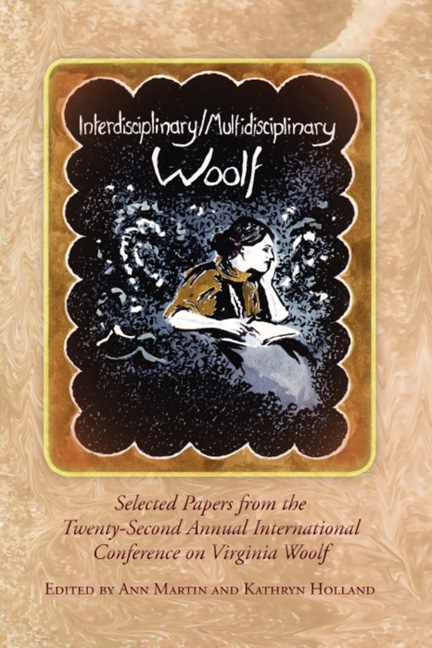Book contents
- Frontmatter
- Contents
- Introduction to Interdisciplinary/Multidisciplinary Woolf
- Acknowledgments
- List of Abbreviations
- History, Materiality, Multiplicity
- Patterns, Practices, Principles
- Art, Influence, Embodiment
- “Time has whizzed back an inch or two on its reel”: Relating Virginia Woolf and Emily Carr through Vintage Postcards, Lily Broscoe, Mrs. McNab, and the Cinematic Time of To the Lighthouse
- Speaking Citizen to Citizen in a Time of War: Miss La Trobe's Use of Parabasis in her Historical Pageant
- Work as Salvation: Eureka's Angel in the House, A Dircetor's Experience
- Drawing as Thinking: A Visual Response to To the Lighthouse
- Performing Feminism, Transmitting Affect: Isadora Duncan, Virginia Woolf, and the Politics of Movement
- Virginia Woolf and Clarice Lispector: Thinking Back Through Brazilian Mothers
- Mystical Gibberish or Renegade Discourse?: Poetic Language According to Orlando
- Selves and Others as Narrative Participants in Woolf's Novels
- Publishing, Politics, Publics
- Notes on Contributors
- Conference Program
Work as Salvation: Eureka's Angel in the House, A Dircetor's Experience
from Art, Influence, Embodiment
- Frontmatter
- Contents
- Introduction to Interdisciplinary/Multidisciplinary Woolf
- Acknowledgments
- List of Abbreviations
- History, Materiality, Multiplicity
- Patterns, Practices, Principles
- Art, Influence, Embodiment
- “Time has whizzed back an inch or two on its reel”: Relating Virginia Woolf and Emily Carr through Vintage Postcards, Lily Broscoe, Mrs. McNab, and the Cinematic Time of To the Lighthouse
- Speaking Citizen to Citizen in a Time of War: Miss La Trobe's Use of Parabasis in her Historical Pageant
- Work as Salvation: Eureka's Angel in the House, A Dircetor's Experience
- Drawing as Thinking: A Visual Response to To the Lighthouse
- Performing Feminism, Transmitting Affect: Isadora Duncan, Virginia Woolf, and the Politics of Movement
- Virginia Woolf and Clarice Lispector: Thinking Back Through Brazilian Mothers
- Mystical Gibberish or Renegade Discourse?: Poetic Language According to Orlando
- Selves and Others as Narrative Participants in Woolf's Novels
- Publishing, Politics, Publics
- Notes on Contributors
- Conference Program
Summary
The process of staging theater can be described as “solving the problem of the play” or answering the question: how are we going to take this story from the page and translate it into time and space for an audience? In the case of Eureka's Angel in the House, the solution - if there is such a thing in a subjective discipline like drama – lay in uncovering the complexities of the piece, which were rooted in its history and the author's intent. Indeed, both the thematic intentions and the historical details of the piece provided many tools by which to engage with the work. The key themes which emerged from the process of researching and rehearsing the play as its director, then interviewing its author in support of an archival project, were a cluster of issues including the fraught nature of community, the personal cost of the creative journey, and the redemptive value of artistic work.
When I was first presented with the script of Angel in the House by Eureka I didn't know how to engage with its structure and form. Instead of a cause-and-effect plotline, the play relied on a unique combination of montage, association, and implication. I would later find that my thoughts had been expressed years earlier by director and dramaturge David Ganon who told Eureka bluntly, “this is not a play” (Eureka). Upon reading the script again, however, I began to get a stronger sense of how its atypical structure might actually be effective theatrically. As I began digging through reams of biography and commentary surrounding the play's central characters, the structure of the play became clearer and so too did the play's value. I realized that Eureka's analysis and interpretation of the characters’ lives and artistic work created not just an enigmatic text, but a play that honestly and bluntly explored the nature of artistic community at the same time that it celebrated the labor of the artist. By the end of my journey as director of the play's second full production, I found myself in the living room of Eureka's New York apartment expressing my appreciation of her accomplishment and defending the merits of the play to its creator.
- Type
- Chapter
- Information
- Interdisciplinary/Multidisciplinary Woolf , pp. 171 - 176Publisher: Liverpool University PressPrint publication year: 2013

